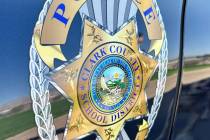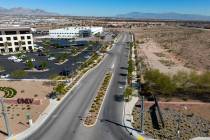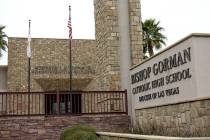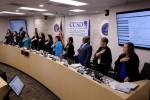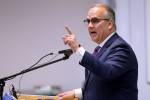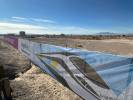Voters to decide on tax increase to improve schools
It's official.
On Nov. 6, voters will choose whether to increase property taxes to pay for Clark County public school improvements.
If approved, the measure would raise the property tax rate, which stands at 55 cents for schools, by about 21 cents per $100 of assessed valuation. Homeowners with a residence assessed at $100,000 would see an increase of $74.20 annually. Taxpayers are still paying off the district's 1998 bond at a rate of $194 a year for the average home assessed at $100,000.
Clark County School District's Board of Trustees unanimously approved ballot language for the measure Friday morning. The district seeks the increase, which would bring in a maximum of $120 million a year for six years, to renovate aging schools, buy new equipment and construct a small number of new and replacement schools. If property values rise, the tax increase would be lessened so that no more than $120 million is annually generated. That cap was requested by several of the other taxing districts: Clark County, Las Vegas, North Las Vegas, Mesquite and the Las Vegas-Clark County Library District.
On Thursday, the Regional Debt Management Commission gave approval for the district to request a tax increase. The commission oversees the district's debt and must give its blessing for the question to be asked of voters. The district won't incur any extra debt if the tax increase passes. It will be paying as it goes, no loan or bond.
"The vote was made unanimously, which I think makes a great statement," said Clark County Commissioner Susan Brager, who chairs the commission and is a former School Board member.
But the district now needs to sell voters on the tax increase, which is just the beginning. The district contends it needs $5.3 billion over the next decade to bring all its schools up to par.
This initial tax increase is just a "bridge," providing 11 percent of that need, district Chief Financial Officer Jeff Weiler said. To get the rest, the district would have to ask voters to extend the tax increase after six years or approve a bond.
But, as of last week, the district would be paying high interest on a bond. Its bond rating was just downgraded from "stable outlook" to "negative outlook" because of the district's shaky finances.
The low rating is the result of a recent arbitrator's decision forcing the district to pay raises to teachers, which district officials said it couldn't afford for any employee groups. To partly cover the cost, the district dipped into its reserve fund, leaving $20 million, which is equal to 1 percent of the district's total operating budget. District policy requires the balance to be 2 percent, at minimum, which is the law for cities in case of emergencies.
Under the measure:
■ More than half of the tax increase would be divided among 19 schools that average 50 years in age for major capital improvements. The schools are Basic, Bonanza, Chaparral, Eldorado, Indian Springs, Laughlin and Moapa Valley high schools; Garside, Hyde Park and Knudson middle schools; Griffith, Ullom, Rowe, Heard, Kelly, McCall and Thomas elementary schools; and the Las Vegas Academy. Indian Springs, Laughlin, Moapa Valley and Virgin Valley high schools would also receive new gyms.
■ Other schools would get overhauls to systems such as heating and cooling. They are Greenspun, Becker, Sawyer, O'Callaghan, Swainston, White and Johnson middle schools, for about
$8.82 million each. These schools were built between 1991 to 1993 and have reached the end of their system's lifespan for Southern Nevada's hot climate, district officials have said.
■ Another 13 schools would receive electrical system upgrades. An electrical upgrade costs about $915,000 per school and would be done at Harris, McWilliams, Dearing, Culley, Red Rock, Long, Beckley and Ferron elementary schools; and Brown, Cannon, J.D. Smith, Cashman and Orr middle schools.
■ Boulder City High School would be able to complete its phased replacement for $33.7 million, and West Prep Academy could be converted to a kindergarten through 12th grade school for
$12 million. Also, $50 million would go for new technology and equipment, such as desks, at various schools.
■ However, details haven't emerged about which two elementary schools would be replaced or where two other new elementary schools would be built to alleviate crowding at existing schools.
Contact reporter Trevon Milliard at tmilliard@review
journal.com or 702-383-0279.








